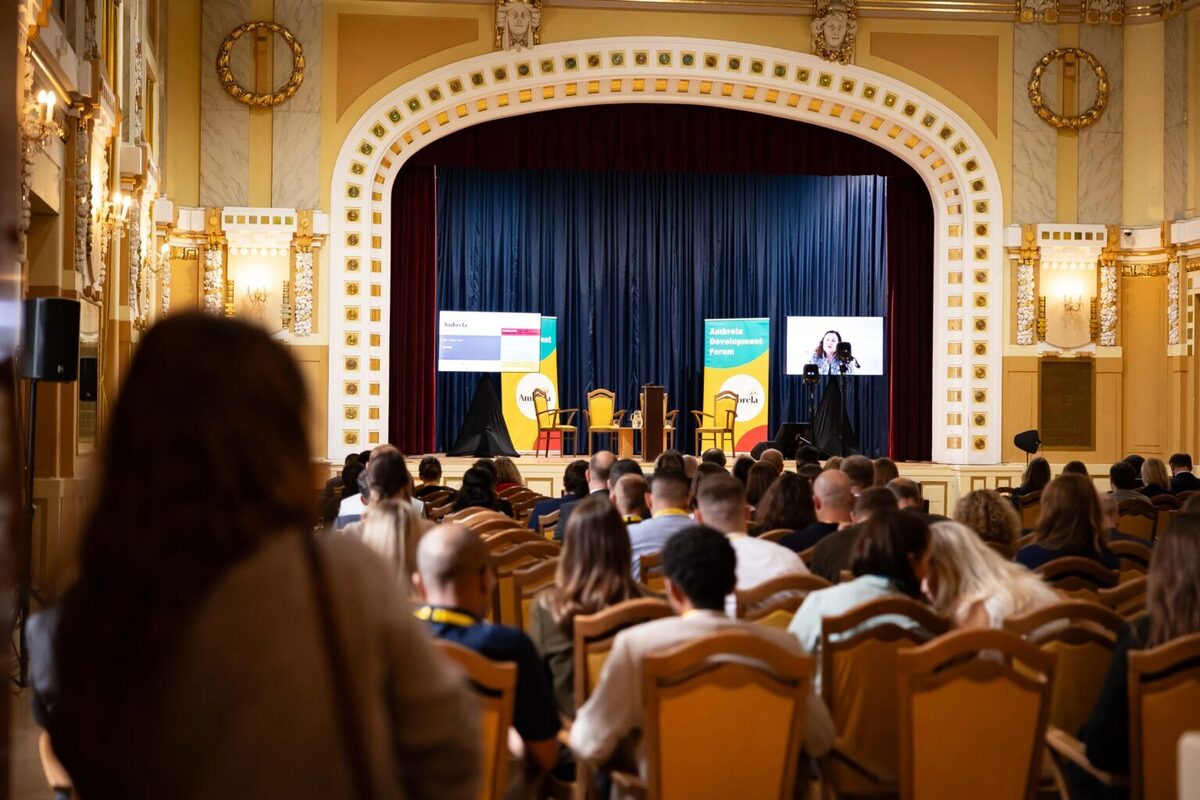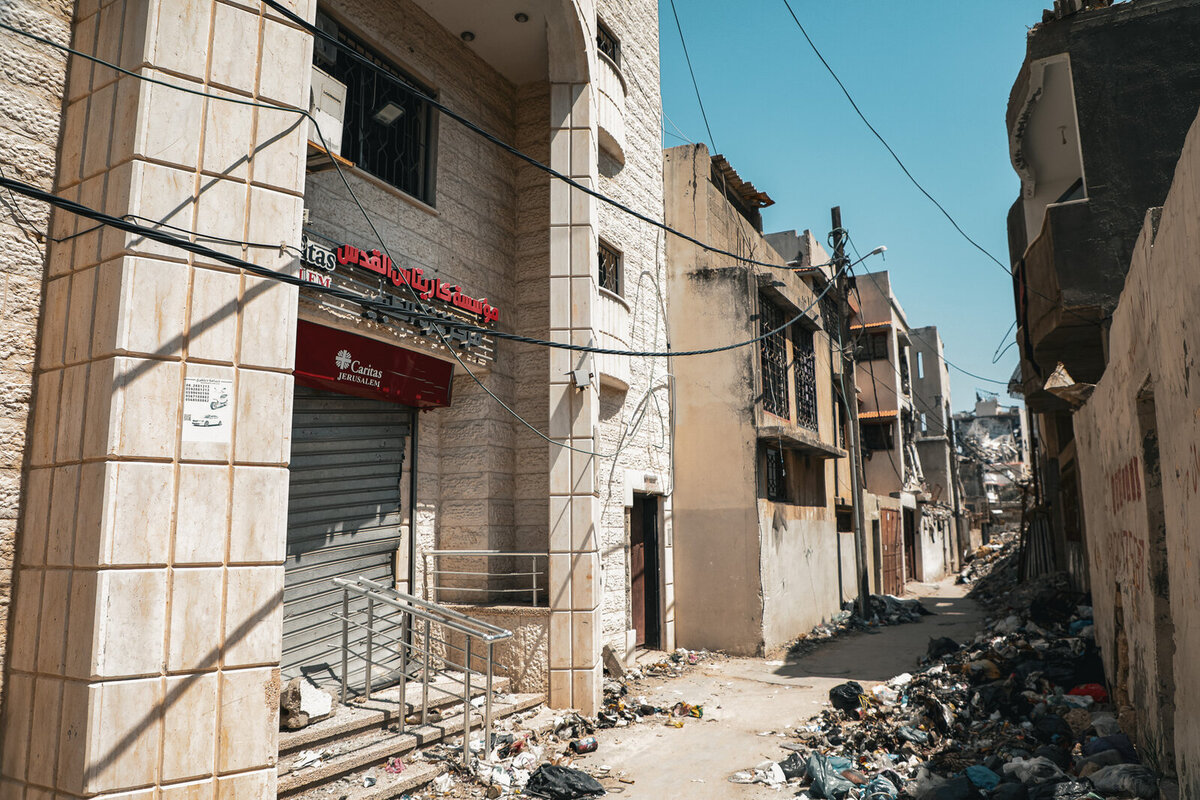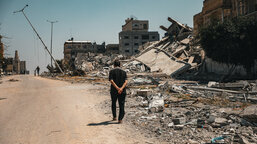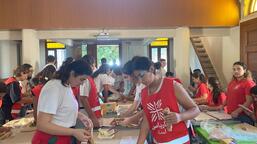On Thursday, October 10, the Ambrela Development Forum took place in Bratislava, Slovakia. It brought together speakers from different countries to talk about the major crises and conflicts the world is currently facing. Among them was our colleague Kateřina Velíšková as a moderator, who led a panel discussion on the issue of providing humanitarian aid during the war in Gaza.
DONATE TO HELP CIVILIANS IN GAZA
Caritas Czech Republic has been helping in Gaza since the beginning of the war
The conflict in Gaza has long been one of the most debated conflicts in the world. October 7th marked exactly one year since it escalated into the current war. People in Gaza face not only the immediate consequences of the war, but also long-term social and economic problems. Caritas Czech Republic, in cooperation with Caritas Jerusalem, has been providing humanitarian aid since the beginning of the war.
In a panel discussion, Kateřina Velíšková, Regional Manager for the Middle East at Caritas Czech Republic, together with Ramez Razzouk, Head of the Health Department at Caritas Jerusalem, Laura Turner, Deputy Director of Emergency Coordination at the World Food Programme (WFP), and Wojtek Wilk, Head of the Polish Centre for International Relief, discussed the difficulties and potential risks of providing humanitarian aid and healthcare to people affected by the war in Gaza. They also answered questions from the live and online audience.
The people of Gaza suffer from a lack of basic human needs
Kateřina Velíšková opened the panel discussion with the current statistics that the war in Gaza leaves behind after twelve months of relentless bombing. "Over 42,000 Gazans have lost their lives. More than 1.9 million people have lost the roof over their heads and nearly 2 million people have no access to the basic necessities of life," Velíšková said, highlighting the risk of famine that Gaza continues to face.
Some 2.1 million Gazans are still in urgent need of food aid. But humanitarian access is limited and aid is difficult to reach Gaza due to the ongoing fighting. "The people of Gaza face a lack of basic human needs every day. The need is not only for food, but also for drinking water, health care and access to proper hygiene," said Laura Turner.
Security of humanitarian workers
During the panel discussion, a question was raised from the audience regarding the protection of humanitarian workers in Gaza. The question was answered by Ramez Razzouk from Caritas Jerusalem. "Humanitarian workers are underdoing a special training so that they are prepared for potential emergencies during their work and also know how to prevent them," said Ramez. Although the medical centeres are located in safer parts of Gaza, 300 humanitarian workers have already died since the war began. Including two humanitarian workers from Caritas Jerusalem.
"There are also evacuation vehicles ready at the health centres to evacuate workers to safety," Ramez added.
The war is very psychologically challenging not only for the people of Gaza, but for humanitarian workers as well. That is why Caritas Jerusalem provides them with important psychological support.
Situation in Lebanon
The war in Gaza is also having a drastic impact on the security and humanitarian situation in Lebanon. The situation there has escalated dramatically in recent days. The war between Hezbollah and Israel has driven 1.2 million people from their homes.
"The population of Lebanon is around 5 million. Compared to this number, the amount of displaced people is huge. Delivering humanitarian aid to these people is very difficult and nearly impossible," Wojtek Wilk said when he was asked about the situation in Lebanon.
Caritas Lebanon is providing immediate humanitarian aid to displaced people. It provides water, food, shelter as well as medical and psychosocial support. Caritas Czech Republic has financially supported partner organisation Caritas Lebanon in providing care to the people affected by the escalation of the conflict.
Caritas next steps to improve the situation in Gaza
Kateřina Velíšková asked Ramez Razzouk what further steps Caritas Jerusalem is planning to take to improve the current situation in Gaza. "We would like to improve access in providing primary health care and psychological support for the people of Gaza, including children, women and the elderly. Among other things, we plan to launch special programmes for vulnerable people," Ramez said.
Although the end of the war is not in sight, Caritas Jerusalem is also addressing how post-war reconstruction might look like.
In a panel discussion, speakers agreed on the challenge of providing aid and basic human needs to the people of Gaza and other surrounding areas affected by the war.
The panel discussion showed how important it is to continue discussions on humanitarian aid and to find ways to support the suffering people of Gaza in their difficult times.
Participation on the Ambrela Development Forum was part of a project on humanitarian aid in Gaza, which Caritas Czech Republic is implementing in cooperation with Caritas Jerusalem and thanks to the financial support of the Ministry of Foreign Affairs of the Czech Republic.
Thank you for helping with us.
DONATE TO HELP CIVILIANS IN GAZA












